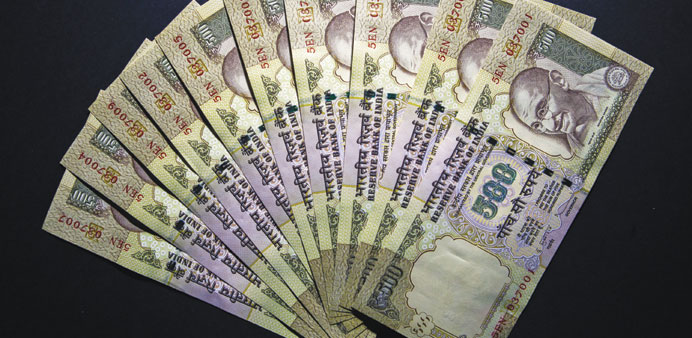The rupee fell 0.2% to 65.8825 a dollar yesterday, the most since September 7.
Bloomberg
Mumbai
India’s benchmark stock index tumbled the most in more than two weeks as the fall in European equities and US stock futures dragged down metal producers and industrials a day before expiry of the monthly derivative contracts.
Vedanta and Hindalco Industries, the nation’s largest producers of copper and aluminium, plunged the most in a month.Tata Motors, owner of Jaguar Land Rover, slid to a one-month low, while Larsen & Toubro, the most valuable engineering firm, fell to its lowest price in nine months. Motherson Sumi Systems, a supplier to Volkswagen, capped its steepest two-day loss since October 2008. The rupee weakened the most in two weeks.
The S&P BSE Sensex tumbled 2.1% to 25,651.84 at the close, after climbing to a two-week high earlier. Twelve of the 30 stocks in the gauge lost at least 3%. The reversal was accompanied by a jump in the gauge’s 30-day historical volatility to its highest level since October 2013, with investors looking ahead to see whether the Reserve Bank of India will lower interest rates on September 29 to bolster the economy and spur a recovery in company earnings.
“While the fall in the European markets was the catalyst, the larger concern is the delay in the pick-up in the earnings momentum,” Sanjay Sinha, founder of Mumbai-based Citrus Advisors said in a phone interview. “Futures and options expiry also kept people on tenterhooks.”
The Sensex earnings climbed 1% in the June quarter, following a 45% drop in the prior three months, data compiled by Bloomberg show.
RBI Governor Raghuram Rajan left the main rate unchanged at 7.25% in August after three cuts in 2015 to meet his inflation target of 6% by January. Official data have shown that consumer price gains slowed to 3.66% last month as oil fell below $50 a barrel and food costs dropped.
Even so, foreigners have remained net sellers of Indian equities for a second month, unloading shares worth $337mn through September 18, as conflicting signals from the Federal Reserve on when it will start raising interest rates curbed demand for riskier assets. They pulled $2.6bn from local shares in August, the most since 2008.
“The rebound was not sustainable and overseas investors are still bearish,” Siddarth Bhamre, head of derivatives at Angel Broking, said by phone from Mumbai. “Stocks are also pressured by selling in index futures before the derivatives expiry.” Vedanta plunged 6.2%, taking this year’s loss to 57%. Hindalco tumbled 6.3%, the most since August 24. Tata Motors slid 4.8% and Larsen & Toubro declined to its lowest level since December 24.
Meanwhile the rupee fell the most in two weeks on concern outflows from local equities will deepen as the benchmark stock index extended its monthly decline.
The rupee fell 0.2% to 65.8825 a dollar in Mumbai, the most since September 7, according to prices from local banks compiled by Bloomberg. It rose as much as 0.3% earlier to 65.5550, the highest level since August 20. Government bonds declined.
“Investors are watching equity market for cues on the rupee,” said Paresh Nayar, the Mumbai-based head of currency and money markets at the local unit of South African lender FirstRand. The bank expects the currency to trade in a range of 65.70-66.30 a dollar over next two days.
Standard Chartered Plc predicts the Fed staying on hold gives the Reserve Bank of India room to reduce rates further after inflation figures came in below the lender’s estimates. Governor Raghuram Rajan has lowered the benchmark repurchase rate by 75 basis points this year. The next review is on September 29 when Standard Chartered sees a 25 basis-point cut.

